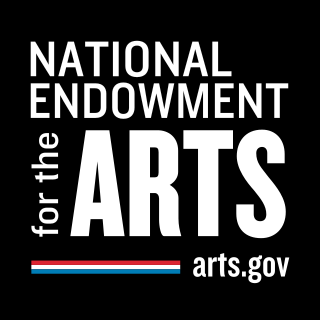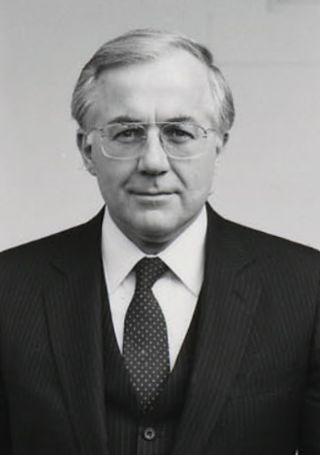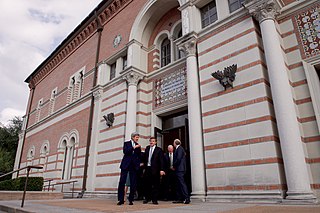
George Herbert Walker Bush was an American politician, diplomat, and businessman who served as the 41st president of the United States from 1989 to 1993. A member of the Republican Party, he also served as the 43rd vice president from 1981 to 1989 under Ronald Reagan, and in various other federal positions prior to that.

The National Endowment for the Arts (NEA) is an independent agency of the United States federal government that offers support and funding for projects exhibiting artistic excellence. It was created in 1965 as an independent agency of the federal government by an act of the U.S. Congress, signed by President Lyndon B. Johnson on September 29, 1965. It is a sub-agency of the National Foundation on the Arts and the Humanities, along with the National Endowment for the Humanities, the Federal Council on the Arts and the Humanities, and the Institute of Museum and Library Services.

Richard Vincent Allen is a former United States National Security Advisor serving President Ronald Reagan from 1981 to 1982. In 1977, prior to Reagan's presidential election in November 1980, he served as Reagan's chief foreign policy advisor. Since 1983, he has been a fellow at the Hoover Institution. He is a past member of the Defense Policy Board Advisory Committee.

The Hoover Institution is an American public policy think tank which promotes personal and economic liberty, free enterprise, and limited government. While the institution is formally a unit of Stanford University, it maintains an independent board of overseers and relies on its own income and donations. It is widely described as conservative, although its directors have contested the idea that it is partisan.

Philip David Zelikow is a U.S. diplomat, academic, and author.

The Ronald Reagan Presidential Library is the repository of presidential records from the Reagan administration. Located in Simi Valley, California, the library is administered by the National Archives and Records Administration and is the burial place of Ronald and Nancy Reagan. It contains millions of documents, photographs, films and tapes. It also contains memorabilia and a permanent exhibit of Ronald Reagan's life.

Ronald Reagan's tenure as the 40th president of the United States began with his first inauguration on January 20, 1981, and ended on January 20, 1989. Reagan, a Republican from California, took office following his landslide victory over Democrat incumbent president Jimmy Carter and independent congressman John B. Anderson in the 1980 presidential election. Four years later, in the 1984 presidential election, he defeated former Democratic vice president Walter Mondale, to win re-election in a larger landslide. Due to U.S. Constitutional law, Reagan was limited to two terms and was succeeded by his vice president, George H. W. Bush, who won the 1988 presidential election. Reagan's 1980 landslide election resulted from a dramatic conservative shift to the right in American politics, including a loss of confidence in liberal, New Deal, and Great Society programs and priorities that had dominated the national agenda since the 1930s.

Howard Eliot Wolpe was an American politician who served as a seven-term U.S. Representative from Michigan and Presidential Special Envoy to the African Great Lakes Region in the Clinton Administration, where he led the United States delegation to the Arusha and Lusaka peace talks, which aimed to end civil wars in Burundi and the Democratic Republic of the Congo. He returned to the U.S. State Department as Special Advisor to the Secretary for Africa's Great Lakes Region. Previously, he had served as Director of the Africa Program at the Woodrow Wilson International Center for Scholars, and of the Center's Project on Leadership and Building State Capacity. While at the Center, Wolpe directed post-conflict leadership training programs in Burundi, the Democratic Republic of the Congo and Liberia.

"Rice University's Baker Institute for Public Policy", also known as the "Baker Institute", is an American think tank housed on the campus of Rice University in Houston, Texas. Founded in 1993, it functions as a center for public policy research. It is named for James A. Baker, III, former United States Secretary of State, Secretary of the Treasury, and White House Chief of Staff. It is directed by Ambassador David M. Satterfield and funded mainly by donor contributions, endowments, and research grants.
The President's Committee on the Arts and the Humanities (PCAH) is an advisory committee to the President of the United States on cultural issues. It works directly with the White House and the three primary cultural agencies: the National Endowment for the Arts (NEA), National Endowment for the Humanities (NEH), and the Institute of Museum and Library Services (IMLS), as well as other federal partners and the private sector, to advance wide-ranging policy objectives in the arts and humanities. These include considerations for how the arts and humanities sectors can positively impact community well-being, economic development, public health, education, civic engagement, and climate change across the United States.

James Clifford Miller III is an American economist and former government official who served as chairman of the Federal Trade Commission (FTC) between 1981 and 1985 and as Budget Director for President Ronald Reagan between 1985 and 1988. Miller was the first member of the FTC with a background as a career economist, as opposed to a legal background as is common.
Gerald L. Parsky is an American financier and former public servant. He is chairman of Aurora Capital Group, a Los Angeles–based private investment firm managing over $2.0 billion of private equity capital.

The presidential memorials in the United States honor presidents of the United States and seek to showcase and perpetuate their legacies.
William Reynolds Ferris Jr. is an American author and scholar and former chairman of the National Endowment for the Humanities. With Judy Peiser he co-founded the Center for Southern Folklore in Memphis, Tennessee; he was the founding director of the Center for the Study of Southern Culture at the University of Mississippi, and is co-editor of The Encyclopedia of Southern Culture.

Martin Anderson was an American academic, economist, author, policy analyst, and adviser to U.S. politicians and presidents, including Ronald Reagan and Richard Nixon. In the Nixon administration, Anderson was credited with helping to end the military draft and creating the all-volunteer armed forces. Under Reagan, Anderson helped draft the administration’s original economic program that became known as “Reaganomics.” A political conservative and a strong proponent of free-market capitalism, he was influenced by libertarianism and opposed government regulations that limited individual freedom.

The 1988 State of the Union Address was given by the 40th president of the United States, Ronald Reagan, on January 25, 1988, at 9:00 p.m. EST, in the chamber of the United States House of Representatives to the 100th United States Congress. It was Reagan's seventh and final State of the Union Address and his eighth and final speech to a joint session of the United States Congress. Presiding over this joint session was the House speaker, Jim Wright, accompanied by George H. W. Bush, the vice president.

The Reagan era or the Age of Reagan is a periodization of recent American history used by historians and political observers to emphasize that the conservative "Reagan Revolution" led by President Ronald Reagan in domestic and foreign policy had a lasting impact. It overlaps with what political scientists call the Sixth Party System. Definitions of the Reagan era universally include the 1980s, while more extensive definitions may also include the late 1970s, the 1990s, and even the 2000s. In his 2008 book, The Age of Reagan: A History, 1974–2008, historian and journalist Sean Wilentz argues that Reagan dominated this stretch of American history in the same way that Franklin D. Roosevelt and his New Deal legacy dominated the four decades that preceded it.
James Sterling Young was an American political scientist, winner of the Bancroft Prize, Professor of Government and Randolph P. Compton Scholar at the University of Virginia.

Kiron Kanina Skinner is a former Director of Policy Planning at the United States Department of State in the Trump administration. Skinner is presently the Taube Professor of International Relations and Politics at the Pepperdine University School of Public Policy, where she teaches graduate courses in national security and public leadership. Prior to that, she was the Taube Professor of International Relations and Politics at Carnegie Mellon University, and the founding director of the Institute for Politics and Strategy and associated centers at the university. She is also the W. Glenn Campbell Research Fellow at the Hoover Institution. After leaving the Department of State, she returned to her position at Carnegie Mellon University until stepping down in 2021.

Stephen F. Knott is an American professor of history and national security. He is the Thomas and Mabel Guy Professor in American History and Government at Ashland University and an emeritus Professor in the Department of National Security Affairs at the United States Naval War College in Newport, RI. Prior to accepting his position at the Naval War College, Knott was co-chair of the Presidential Oral History Program at the Miller Center of Public Affairs at the University of Virginia.
















